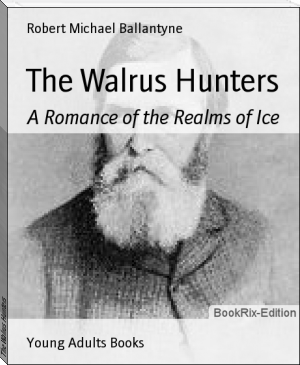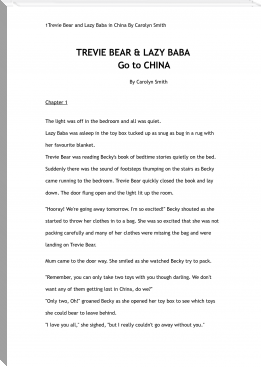The Walrus Hunters - Robert Michael Ballantyne (best book clubs .txt) 📗

- Author: Robert Michael Ballantyne
Book online «The Walrus Hunters - Robert Michael Ballantyne (best book clubs .txt) 📗». Author Robert Michael Ballantyne
"Man, this iss fine weather--whatever."
"It is that," replied Mowat, who could hardly have replied otherwise, for the fact did not admit of a doubt.
There was an intense brilliancy yet a hazy softness in the air, which was particularly exhilarating. Trumpeting wild-geese, piping plover, the whistling wings of wild-ducks, and the notes of other innumerable feathered tribes, large and small, were filling the woods and swamps with the music of autumnal revelry, as they winged their way to southern lands. Every view was beautiful; all the sounds were cheerful. An absolute calm prevailed, so that the lake-like expanse in front of the fort formed a perfect mirror in which the cliffs and brilliant foliage of the opposite banks were clearly reflected.
"We will go down to the bend o' the ruver," said MacSweenie, as they launched their canoe, "an' hide in the bushes there. It iss a grand spote for birds to fly over, an' there's plenty o' ducks an' geese, so we may count on soon gettin' enough to fill the larder to overflow."
"Ay, there's plenty o' birds," remarked Mowat, with the absent air of a man whose mind is running on some other theme.
MacSweenie was a keen sportsman, and dearly loved a day with his gun. As a boy, on his own Highland hills, he had been addicted to sporting a good deal without the formality of a licence, and the absolute freedom from conventional trammels in the wild North was a source of much gratulation to him. Perhaps he enjoyed his outings all the more that he was a stern disciplinarian--so deeply impressed with a sense of duty that he would neither allow himself nor his men to indulge in sport of any kind until business had been thoroughly disposed of.
"It hes often seemed to me," he said, steering towards the bend of the river above referred to, "that ceevilisation was a sort o' mistake. Did ye ever think o' that, Tonal'?"
"I can't say that I ever did. But if it is a mistake, it's a very successful one--to judge from the way it has spread."
"That iss true, Tonal', an' more's the peety. I cannot but think that man was meant to be a huntin' animal, and to get his victuals in that way. What for wass he gifted wi' the power to hunt, if it wass not so? An' think what enjoyment he hes in the chase until ceevilisation takes all the speerit out o' him. H'm! It never took the speerit out o' me, whatever."
"Maybe there wasn't enough o' ceevilisation in the place where you was brought up," suggested the interpreter.
"Ha! ye hev me there, Tonal'," returned the trader, with a short laugh. "Weel, I must admit that ye're not far wrong. The muddle o' the Grampians iss but a wildish place, an' it wass there my father had his sheep-farm an' that I first made the acquaintance o' the muir-cock an' the grouse. O man! but there's no place like the Heeland hills after a', though the wild-woods here iss not that bad. Tonal', man, catch hold o' that bush an' draw close in to the bank. There's a flock comin', an' they're fleein' low."
The last words were spoken in a hoarse whisper, for they had just turned the bend of the river, and MacSweenie had caught sight of a flock of wild-geese, flying low, as he said, and crossing over the land, which at that place jutted out into the stream.
Mowat, though naturally sluggish, was quick in action when circumstances required him to be so. The canoe was drawn close under an overhanging bush, and quite concealed by it. The two men, laying down the paddles, took up their guns and examined the priming to see that it was dry, long before the flock drew near. Then they sat motionless and silent, crouching a little and looking upwards.
The unsuspicious flock of wild-geese came over the point in that curious angular formation in which they usually travel--an old grey gander, as usual, leading. A deep trumpet-note now and then told of their approach. Then the soft stroke of their great wings was heard. Next moment the flock appeared over the edge of the bush that concealed their human foes. At the same instant sportsmen and geese beheld each other. The guns flew to the shoulders of the former; the angle was thrown into dire confusion, and the woods and cliffs reverberated with two shots, which crashed forth at the same moment.
Trumpeting and screaming, the scattered flock passed on, and the hunters pushed out from the bank to pick up two plump birds which lay dead upon the water.
But those two shots did more than carry death and confusion into the ranks of the grey geese. They caused surprise and something like wild excitement in the hearts of a number of Eskimos who, in their kayaks, happened to be at that moment pushing up the Ukon River, pioneered by a birch-bark canoe, which was propelled by an Indian man and woman.
Submitting to authority while among the ice-floes of the polar seas, Nazinred had, as we have seen, consented to take his place humbly among the women and children in one of the oomiaks. Anteek and one of his companions were permitted to paddle the birch-bark canoe, to their very great satisfaction, until Whale River was reached. But the moment the party entered on the lakes and rivers of the land, Nazinred ordered Adolay to take the bow paddle of his native craft, himself took the steering paddle, and from that moment he had quietly assumed the office of guide to the expedition.
"Fire-spouters!" exclaimed Cheenbuk, on hearing the shots of the traders' guns.
"Yes--my countrymen," replied Nazinred.
The kayak of Cheenbuk was about half a length behind the canoe, else the Eskimo would have seen that though the Indian's voice was low and calm, his black eyes glittered with excitement.
"It is not like the gun of the Dogribs," remarked Adolay, glancing back at her father.
"Why does Adolay think so?"
"Because there is too much noise. You have yourself told me, father, that the Indian uses a smaller charge both of powder and shot than the white trader, as he cannot afford to waste it. I never heard the guns of our men speak so loud. Perhaps we are going to meet white men."
The chief regarded his daughter with a pleased smile and a look of pride.
"Adolay observes well," he said; "she is like her mother. The sound was loud because the charges were big--also because two guns were fired at once."
"I heard only one," returned the girl.
"That is because you have not heard much firing of guns. Adolay is not yet as old as her father. The traders from the great fresh lake must have come to our land, and that is the reason why our people have forsaken the old home."
As he spoke the flotilla rounded a point on the river, and came in sight of MacSweenie's canoe making for the land after having picked up the geese.
An impartial observer would not have found it easy to determine which party expressed more surprise.
"Fire-spouters!" shouted the new arrivals.
"Eskimos!" exclaimed Mowat.
"Savitches--whatever!" said MacSweenie. "Wow! but this _iss_ goot luck! Gif way, my boy, an' we will meet them more than half-way."
Suddenly the trader ceased to paddle, and raised a hand to shade his eyes from the sun.
"Tonal', man!" he growled with a Gaelic expletive which it is impossible to spell, "iss that a birch-bark canoe that I am seein'?"
"It is that," answered the interpreter, "an' I do believe that--that--"
"Man! Tonal'," interrupted the trader, as he dipped his paddle violently into the water. "It's wishin' I am that I may never see the Grampians again in this world if yon iss not Nazinred himself wi' his daater in the bow! It iss my belief there will be rechoicing in the Dogrib camp this night--though wi' such a band o' Eskimos there will be no small risk o' fechtin' also!"
By this time the canoe and flotilla were so near that Nazinred recognised the trader, and threw up a hand in salutation, whereupon MacSweenie and Mowat, taking off their caps, treated the party to a rousing British cheer, which was so congenial to the lively Eskimos that they burst into a sympathetic howl, mingled with laughter and some fair attempts to imitate the cheer, while they splashed up the water with their paddles, and otherwise conducted themselves jovially.
Of course Nazinred would not condescend to conduct so undignified, but in his way he expressed great satisfaction at the happy meeting.
Then all the paddles were dipped again with vigour and the whole party made for the fort--the two canoes leading.
CHAPTER THIRTY THREE.
THE LAST.
"I will be thinkin'," said MacSweenie to Mowat, "that it will be safer for our two canoes to go first to the fort an' leave the Eskimos behind the point till we warn the Indians o' their arrival; for there iss no knowin' what these fiery savitches may do if their old enemies come on them all of a sudden. Tell Nazinred that."
The interpreter obeyed, and as the chief was of the same opinion, a halt was called; Cheenbuk was consulted, and ultimately the Eskimos in their kayaks were left concealed behind the nearest point below the fort, while the two canoes advanced side by side.
"We will take them by surprise, Tonal'. I'm fond o' givin' people a surprise," said MacSweenie in an undertone as they drew near to the little wharf that had been run out from the land in front of the main building. A few Indians were watching the arrival with some curiosity.
But there was one passenger in Nazinred's canoe who cared little for interfering with human plans--namely, Attim, whose shaggy head rested on the gunwale as he gazed and snuffed anxiously.
The moment the canoes came within a few yards of the shore, the excited dog plunged over the side with a huge bound. He was a magnificent swimmer, and reached the land in a few seconds. Springing up the bank, he shook a shower from his sides and bounded into the bushes, with the certain knowledge, no doubt, that he had reached home at last, and that his faithful nose would not fail to guide him to the tent of Isquay.
"O ye rascal!" growled MacSweenie, "you've let the cat out o' the bag-- for I make no doubt that every man an' wummin o' the tribe knows you by sight."
And the Highlander was right, for in a few minutes the whole camp was roused, and the sight of the dog told them that Nazinred had come back. But had he found his daughter? That was a point which every one who could walk, run, or hobble, hurried to the wharf to ascertain.
But the point was cleared up sooner than they expected, for, before they reached the wharf, a graceful figure was seen to be bounding through the bushes, apparently in hot pursuit of the dog.
Immediately after that a treble scream was heard to issue from a coppice behind the fort. It was followed by an equally treble





Comments (0)